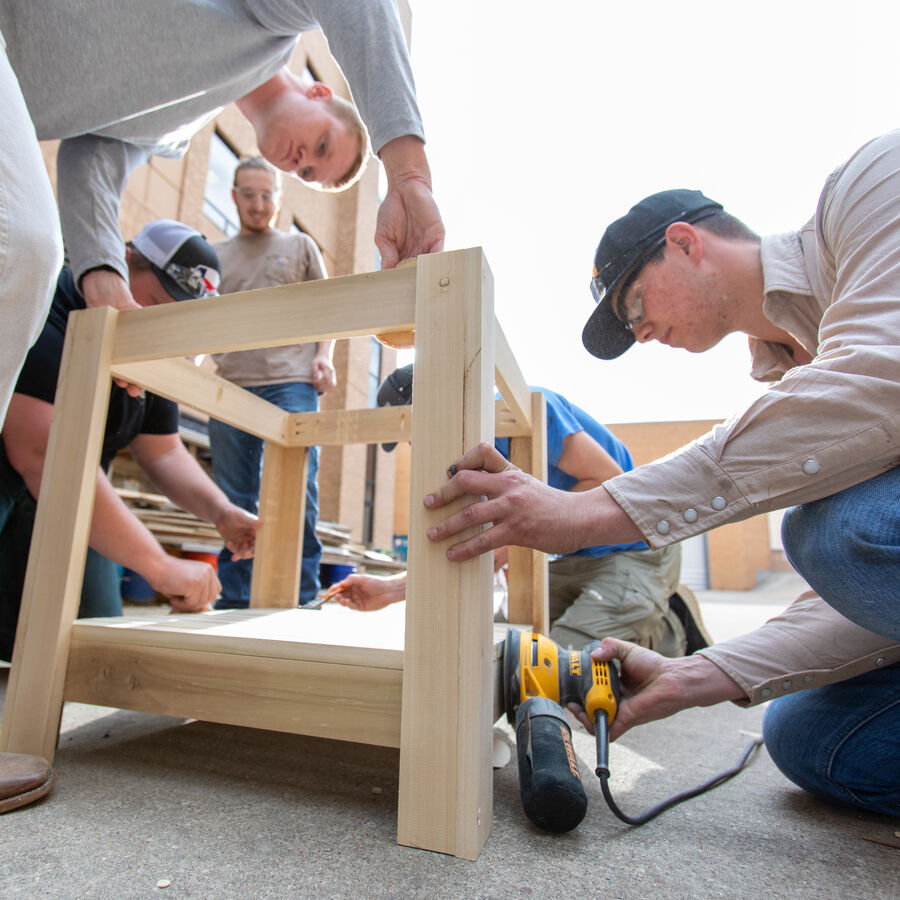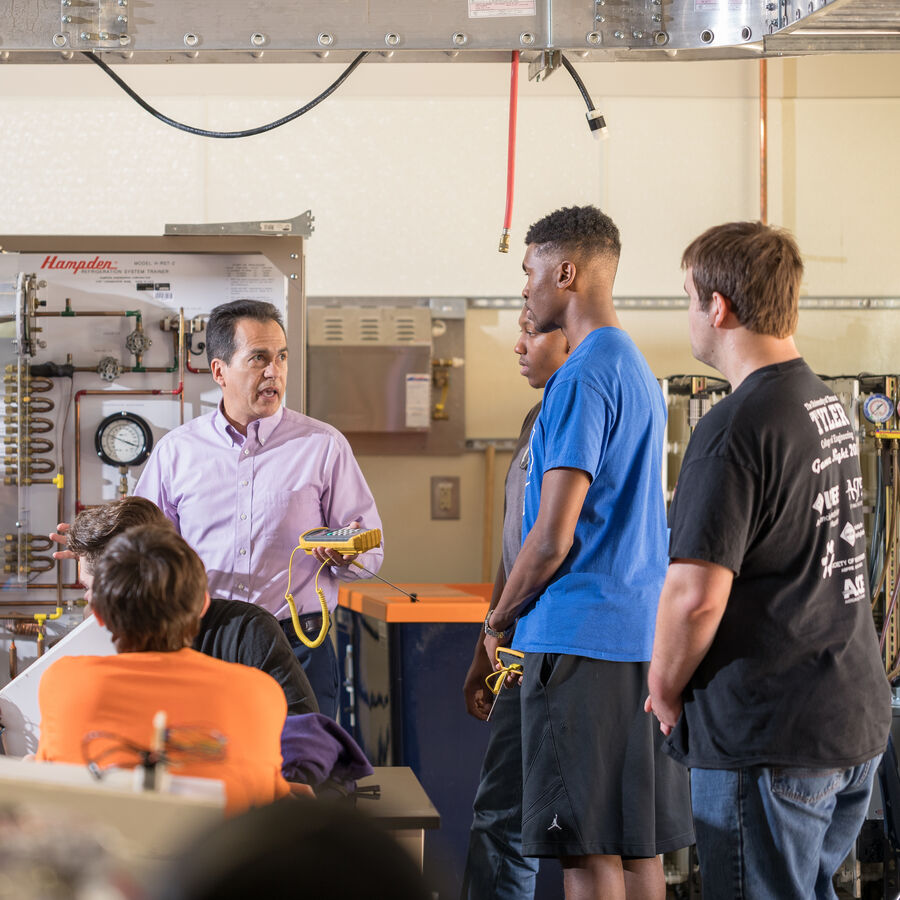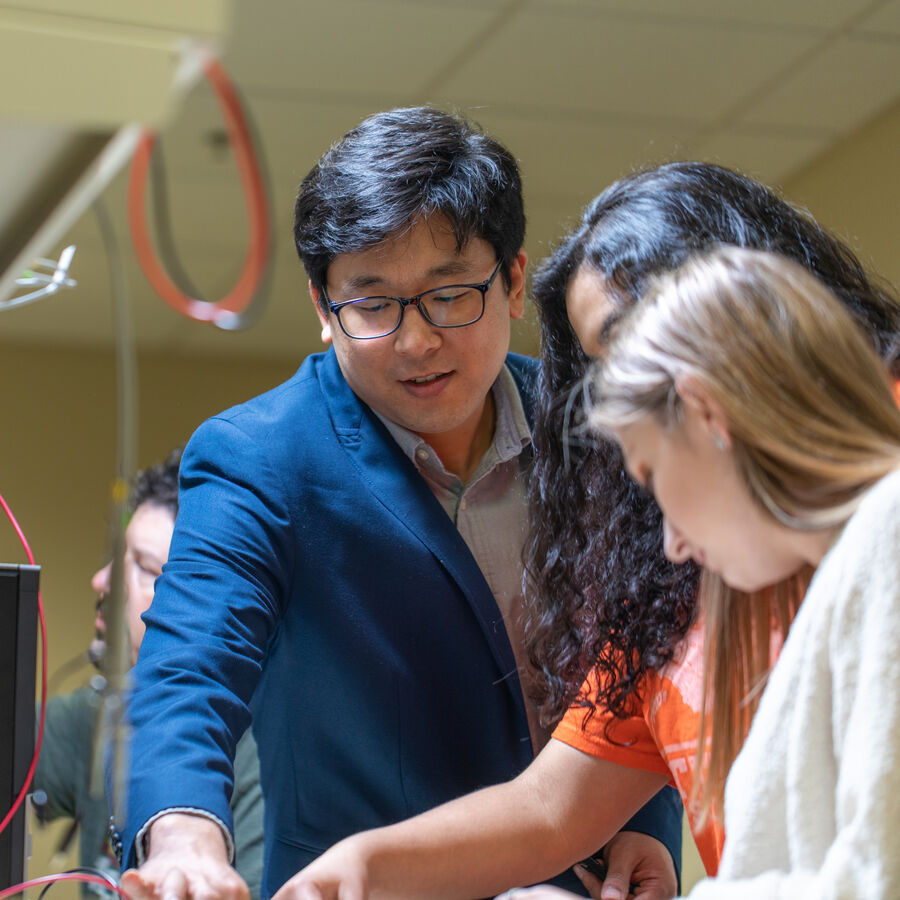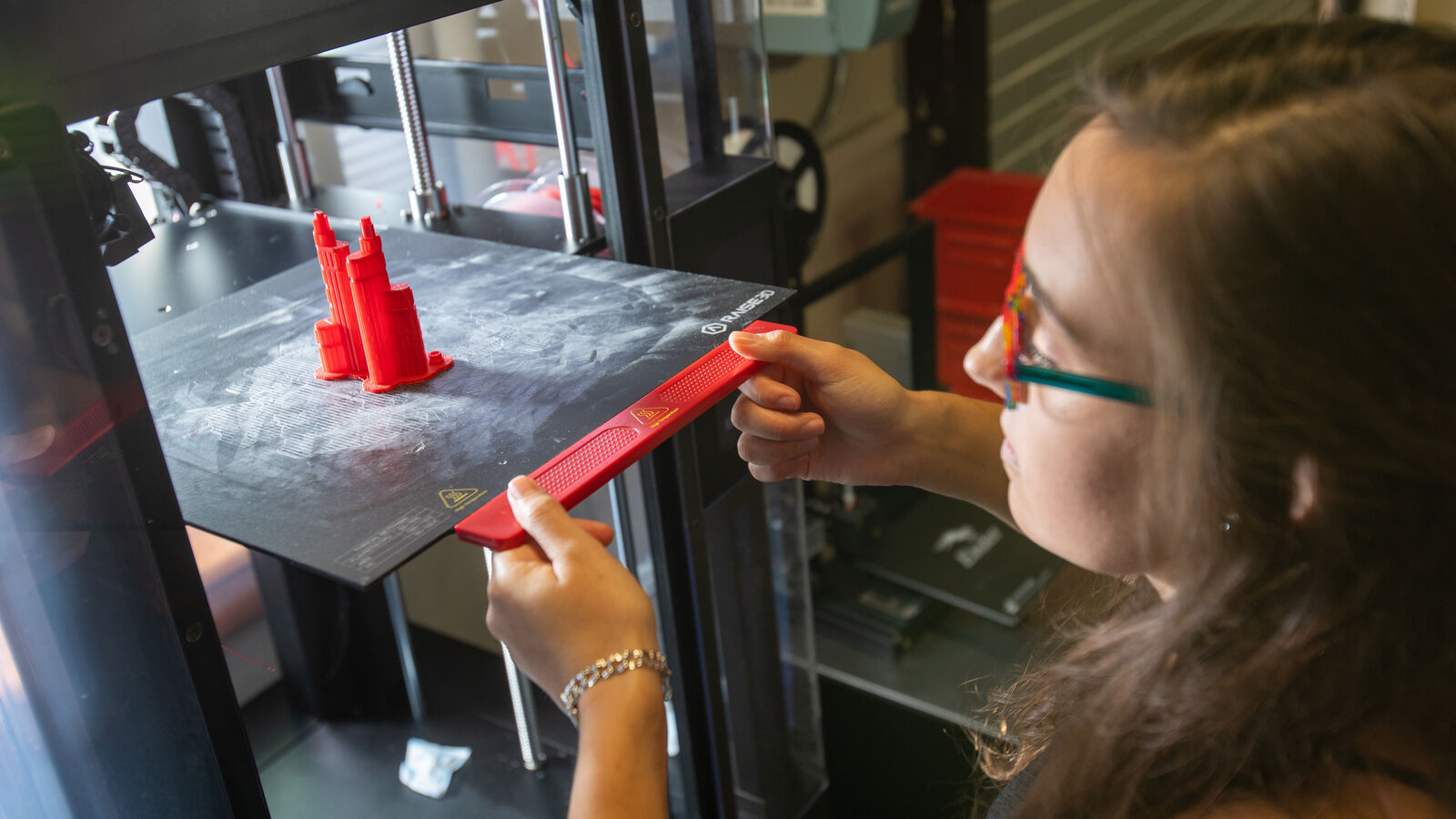
Bachelor of Science in Civil Engineering
Design and Develop Infrastructure Across East Texas and the World
Help create strong communities in East Texas and beyond by planning, designing and developing sustainable infrastructure that allows our society to advance and expand. Civil engineers have an impact on our daily lives, serving the communities where they live. From developing plans that improve the safety of highways and bridges to designing energy-efficient pavement roadways and buildings, civil engineers are integral to society’s progress and daily operations.
UT Tyler’s nationally ranked Bachelor of Science in civil engineering program prepares you through hands-on learning beginning your first year and rigorous coursework that covers the fundamentals of structural engineering, pavement engineering, transportation engineering, hydrology, geotechnical engineering, surveying and environmental engineering. As a result of this comprehensive training, our program has a nearly 100% placement rate upon graduation.
Why Major in Civil Engineering at UT Tyler?
UT Tyler’s Bachelor of Science in civil engineering program prepares students for a rewarding career in planning, construction, research and development, operations and maintenance. Our program, part of the only comprehensive engineering college in East Texas, rivals engineering programs in large research institutions.
- Comprehensive curriculum: Students gain the expertise to become engineering leaders and assume responsibility for multidisciplinary engineering design, project construction, asset management and ethical decision-making in professional practice.
- Hands-on experience: Beginning your first year, you’ll explore civil engineering from a real-world, applied perspective guided by expert faculty members. Your capstone experience will focus on an actual engineering project. Past capstones have involved UT Tyler students designing the UT Tyler Art Complex, completing the University Center and realigning Lazy Creek and Patriot Avenue.
- Top facilities: You’ll experience hands-on learning in our Texas Rural Transportation Research Center,
plus hydrology/environmental, material analysis and fabrication labs.
Experienced faculty: Every professor in the UT Tyler civil engineering program has extensive industrial experience in the field. You’ll receive individual attention from faculty who are wholly student-focused and dedicated to professional excellence. - Nationally ranked: U.S. News & World Report named UT Tyler’s College of Engineering one of the top 50 engineering programs in the U.S. For the second consecutive year, UT Tyler is the highest-ranked Texas public institution on the publication’s Best Undergraduate Engineering Programs (no doctorate) list.
- Nationally accredited: The University of Texas at Tyler civil engineering program is accredited by the Engineering Accreditation Commission of ABET. With ABET accreditation, students and employers can be confident the program meets the quality standards that produce graduates prepared to enter a global workforce.
- Return on investment: Our graduates are among the highest compensated of all civil engineering alumni in the UT system. Our tuition is affordable, resulting in an unbeatable return on your educational investment. Nearly 100% of UT Tyler civil engineering graduates find jobs upon graduation.
- Networking: You can network with peers as a member of the American Society of Civil Engineers (ASCE) student chapter, which features speakers and sponsors activities like the concrete canoe competition and AISC Steel Bridge Competition.
What You’ll Learn
You’ll receive a broad-based education, learning the fundamentals of the engineering field’s key disciplines: structural, pavement materials, transportation, hydrology, construction, geotechnical, environmental and surveying, in addition to fluid mechanics and construction materials. All undergraduate civil engineering students receive basic instruction in the sciences, engineering science and engineering design behind the field. Coursework emphasizes hands-on, real-world applications starting from your first year.
During your first and second years, you’ll take courses in broadly applied engineering, science and design principles:
- Engineering Graphics
- Engineering Mechanics
- Engineering Mechanics: Dynamics
- Fundamentals of Speech Communication
- General Chemistry
- History of Technology and Innovation in U.S. Society since 1865
- Introduction to Engineering
- Introduction to Ethics
- Mechanics of Materials
During your junior and senior years, you’ll dig deep into the field of civil engineering, studying such topics as:
- Civil Engineering Construction Management
- Civil Engineering Materials, Codes, and Specifications
- Civil Engineers and Leadership, Public Policy, Business Practices and Asset Management
- Introduction to Pavement Engineering and Sustainable Transportation Infrastructures
- Environmental Engineering Design
- Fluid Mechanics and Hydraulics
- Foundation Design
- Probability and Statistics for Engineers and Scientists
- Pavement Management Systems
- Reinforced Concrete and Steel Design
- Bituminous Materials and Mixtures
- Structural Analysis
Senior year, you’ll work on design problems with multidisciplinary teams in cooperation with representatives from engineering firms, industry or government organizations. This design work will culminate in a senior design project.
Civil Engineering Major Requirements Visit the Civil Engineering Degree Page
What Can You Do With a Bachelor’s Degree in Civil Engineering?
As a graduate of our program, you’ll be ready to take part in the planning, design, construction and operation of facilities essential to modern life, ranging from pavement roadways to offshore structures to space satellites. Access opportunities locally to build and advance the infrastructure of East Texas — or tackle challenges related to resource use and developing longer-lasting, more sustainable transportation structures worldwide.
According to the U.S. Bureau of Labor Statistics, starting salaries in the civil engineering field are among the highest paid to college graduates — and demand is expected to increase 7% through 2031. Although most civil engineers are employed in private industry, many are involved in consulting, and a significant number are involved in public works for state and local government.
UT Tyler civil engineering program graduates have gone on to jobs ranging from working with state highway departments and oil companies to designing buildings and water systems.
How to Apply
The University of Texas at Tyler offers a streamlined admissions process for all undergraduate students. Have questions or concerns? Our admissions team can guide you through all requirements and answer any questions you may have. Reflecting our reputation as one of the most affordable colleges in the state, our financial aid team helps you explore all scholarships, grants and other forms of assistance.
For admissions decisions in general:
- UT Tyler automatically accepts students from the Top 25% of graduating classes in Texas.
- Students from the 2nd to 4th quartiles must have a 2.75 or higher GPA.
Ready to apply? Review all undergraduate requirements to get started.
Start Your ApplicationUT Tyler has established partnerships with community colleges across Texas, allowing for a seamless transfer of your credits. Our relationships let you stick with your degree plan and graduate on time, right on your schedule.
UT Tyler has partnered with Tyler Junior College and Houston Community College to create a direct pathway toward the Bachelor of Science in civil engineering degree.
Through UT Tyler’s partnership with Houston Community College, students have the opportunity to earn a Bachelor of Science degree in engineering at the UT Tyler Houston Engineering Center (HEC), located on the second floor of the HCC Alief Hayes Campus in Houston.
Students begin coursework at HCC and earn an associate degree before transferring to UT Tyler. As a student considering this pathway, you’ll then select majors in mechanical engineering, electrical engineering, civil engineering or construction management to finish your UT Tyler bachelor’s degree at the HEC.
Complete a master’s degree in just one additional year. Students interested in the 4+1 pathway must apply no later than the end of the spring semester of their junior year. Once admitted, students may take up to nine credits of graduate coursework during their senior year that will count toward both their BS and MS degrees. Students must also take one credit of an undergraduate research seminar during their senior year. The program requires the completion of a project or thesis.
July 1
ApplyTexas application opens for incoming first-year students.
October 1
The Free Application for Federal Student Aid (FAFSA®) opens for the upcoming academic year.
December 1
Application deadline to be eligible for scholarships.
May 1
Deadline for Valedictorian, Salutatorian and Transfer Presidential Scholarships.
August 1
Deadline for Patriot Promise Scholarship.
Spotlight
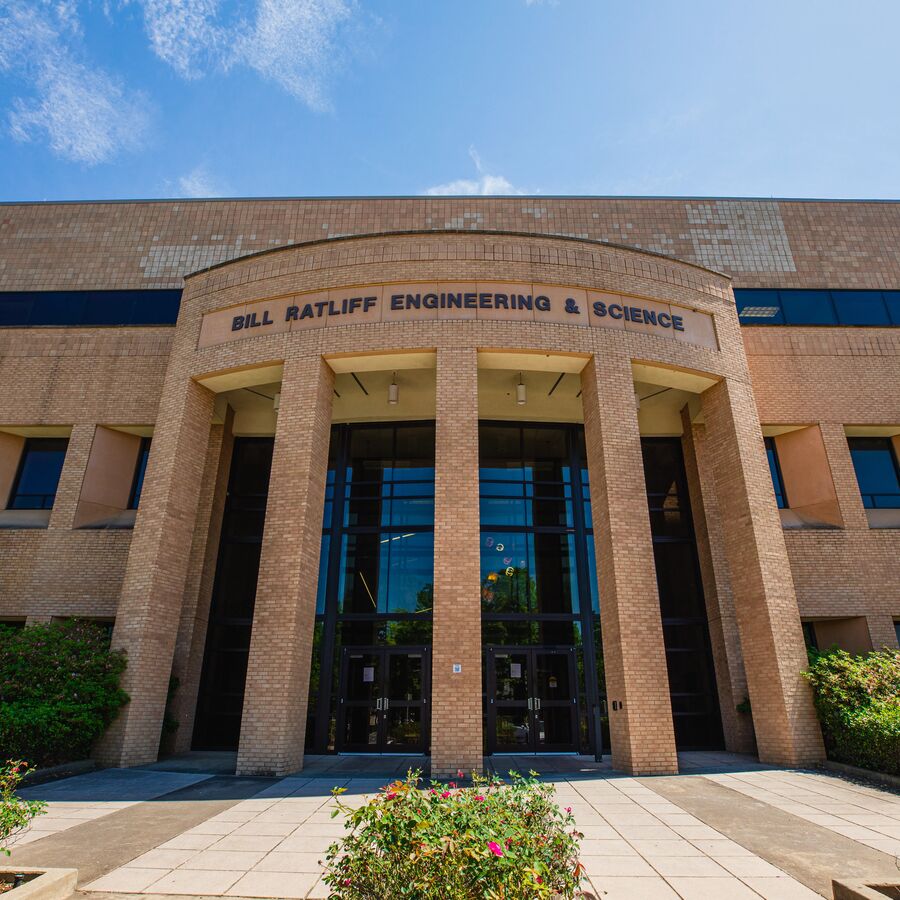
Explore Related Programs
Next Steps
Get ready for success. Prepare to build a more advanced, efficient and sustainable world with a Bachelor of Science in civil engineering from UT Tyler.
